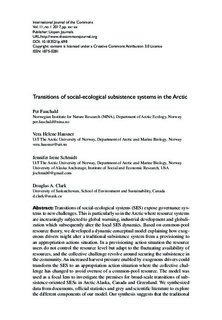| dc.description.abstract | Transitions of social-ecological systems (SES) expose governance systems to new challenges. This is particularly so in the Arctic where resource systems are increasingly subjected to global warming, industrial development and globalization which subsequently alter the local SES dynamics. Based on common-pool resource theory, we developed a dynamic conceptual model explaining how exogenous drivers might alter a traditional subsistence system from a provisioning to an appropriation actions situation. In a provisioning action situation the resource users do not control the resource level but adapt to the fluctuating availability of resources, and the collective challenge revolve around securing the subsistence in the community. An increased harvest pressure enabled by exogenous drivers could transform the SES to an appropriation action situation where the collective challenge has changed to avoid overuse of a common-pool resource. The model was used as a focal lens to investigate the premises for broad-scale transitions of subsistence- oriented SESs in Arctic Alaska, Canada and Greenland. We synthesized data from documents, official statistics and grey and scientific literature to explore the different components of our model. Our synthesis suggests that the traditional Arctic subsistence SESs mostly comply with a provisioning action situation. Despite population growth and available technology; urbanization, increased wage labor and importation of food have reduced the resource demand, and we find no evidence for a broad-scale transition to an appropriation action situation throughout the Western Arctic. However, appropriation challenges have emerged in some cases either as a consequence of commercialization of the resource or by severely reduced resource stocks due to various exogenous drivers. Future transitions of SESs could be triggered by the emergence of commercial local food markets and Arctic warming. In particular, Arctic warming is an intensifying exogenous driver that is threatening many important Arctic wildlife resources inflicting increased appropriation challenges to the governance of local harvest. Keywords: Climate change, conservation, fish and wildlife, globalization, socioecological systems, subsistence, sustainability | nb_NO |

